Introduction: My 30-Day Testing Journey
I spent a month testing Hostinger and Namecheap because picking the wrong web host is like choosing a bad roommate – it's going to make your life miserable. After clicking around their websites way too much and probably drinking too much coffee, I'm here to tell you what actually works and what doesn't. No fancy tech talk, just the real deal on which one won't give you headaches.
Both Hostinger and Namecheap are popular choices for website hosting in 2025, but they differ significantly in various aspects. Hostinger is known for its affordability combined with modern features including AI tools, while Namecheap lives up to its name with budget-friendly pricing and user-friendly approach.
I'm going to walk you through everything that matters when picking between these two – how much they cost, how fast your site will load, what extras you get, how safe your stuff is, and whether their help desk actually helps. When we're done here, you'll know which one makes sense for what you're trying to do online.
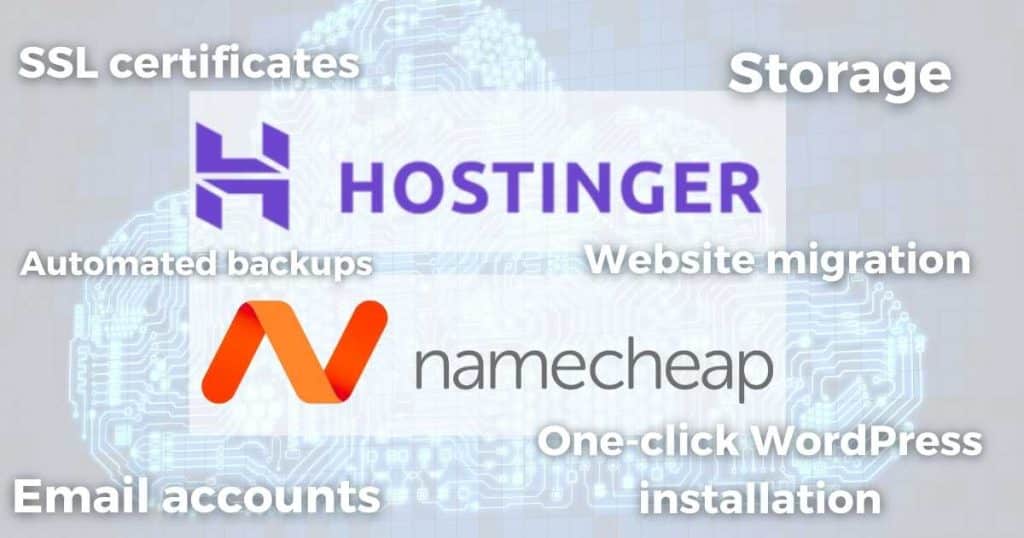
Hostinger vs Namecheap: Two popular hosting providers in 2025
Quick Verdict: Which One Should You Choose?
If you're in a hurry, here's my quick verdict after 30 days of testing both platforms:
Choose Hostinger if:
- You want the best overall performance and value
- You need modern features like AI tools
- Security is a top priority for your website
- You want a more intuitive dashboard experience
- You need more email accounts (up to 100)
Choose Namecheap if:
- You're on an extremely tight budget
- You need unlimited storage on basic plans
- You prefer a traditional cPanel interface
- You want a 100% uptime guarantee
- You primarily need domain registration services
While both hosting providers have their strengths, Hostinger edges out Namecheap in most categories including performance, security features, and overall value for money. Continue reading for my detailed analysis of each aspect.
Pricing Comparison: Which Offers Better Value?
Let's start with what many consider the most important factor - pricing. Both Hostinger and Namecheap are known for their affordable hosting plans, but there are significant differences in what you get for your money.
| Feature | Hostinger | Namecheap | Winner |
|---|---|---|---|
| Starting Price | $2.99/month | $1.98/month | Namecheap |
| Storage (Entry Plan) | 25GB SSD | 20GB SSD | Hostinger |
| Free Domain (1st year) | Yes | Yes | Tie |
| Free SSL Certificate | Lifetime | First year only | Hostinger |
| Email Accounts | Up to 100 | Up to 30 | Hostinger |
| Automated Backups | Weekly (free) | Twice a week (premium plans only) | Hostinger |
| Money-back Guarantee | 30 days | 30 days | Tie |
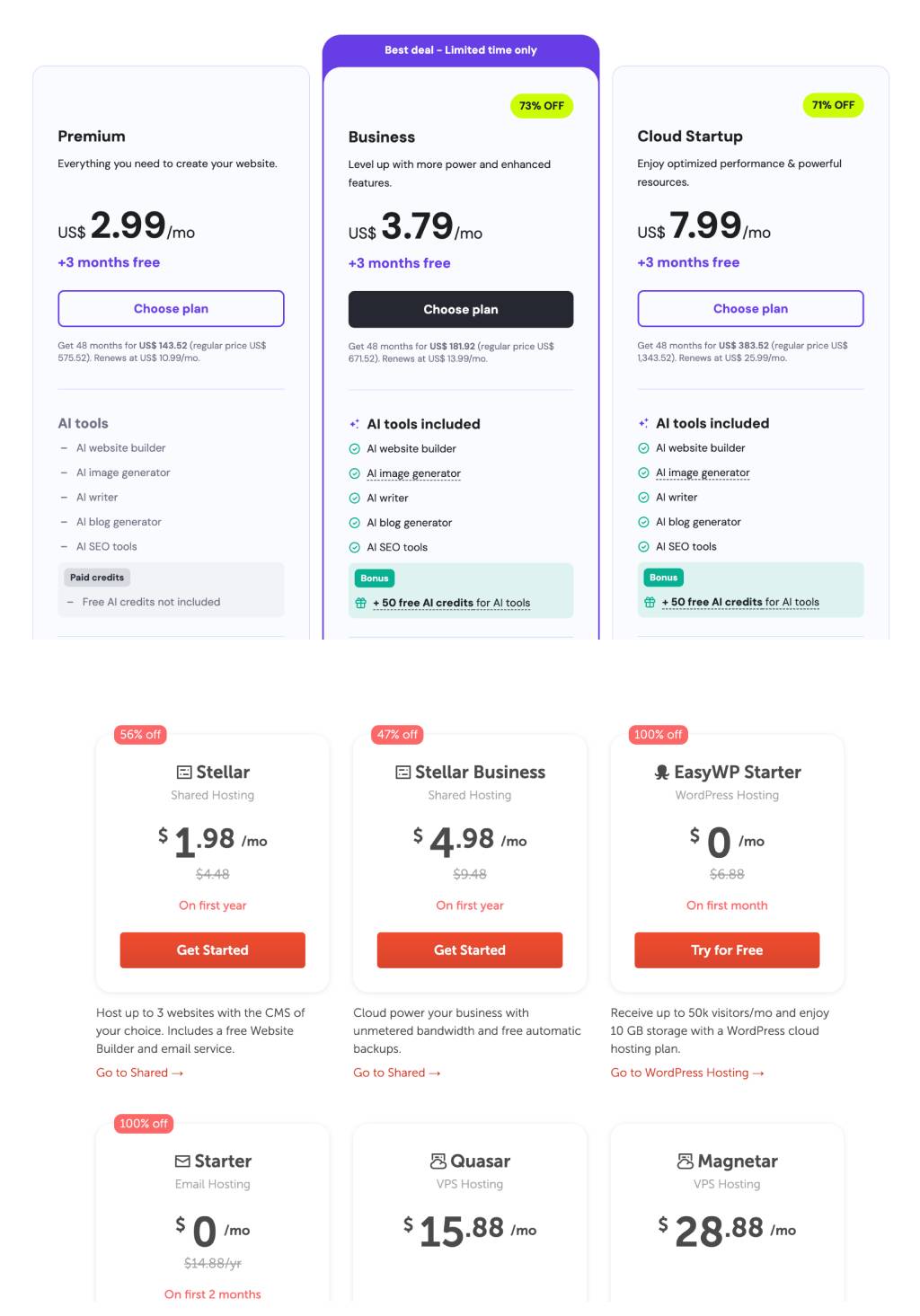
Pricing plans comparison between Hostinger and Namecheap (July 2025)
Pricing Analysis
While Namecheap wins on initial pricing with its incredibly low starting price of $1.98/month compared to Hostinger's $2.99/month, it's important to look beyond just the numbers.
Hostinger provides significantly more value with its entry-level plan, offering more storage, lifetime SSL certificates, and free weekly backups. Namecheap requires upgrades to more expensive plans for features that come standard with Hostinger.
It's also worth noting that both providers offer promotional pricing for the first term, with renewal rates being higher. However, Hostinger's renewal rates tend to remain more competitive in the long run.
Hostinger Pricing Pros
- Better value for money with more included features
- More storage on entry-level plans
- Lifetime free SSL certificates
- Free weekly backups included
- More email accounts (up to 100)
Namecheap Pricing Pros
- Lower initial price point ($1.58/month)
- Unlimited websites on mid-tier plans
- Domain privacy included with domain purchases
- Competitive domain registration prices
- No hidden fees
For this round, while Namecheap has a lower entry price, Hostinger provides better overall value with more included features that would cost extra with Namecheap.
Performance & Uptime: Speed Matters
When it comes to website hosting, performance is crucial. Slow-loading websites frustrate visitors and can negatively impact your search engine rankings. I conducted extensive tests on both Hostinger and Namecheap to measure their performance.
Speed Test Results
I used GTmetrix and PageSpeed Insights to analyze loading speeds and performance metrics for both hosting providers. Here's what I found:
| Metric | Hostinger | Namecheap | Winner |
|---|---|---|---|
| Average Page Load Speed | 3.9 seconds | 2.9 seconds | Namecheap |
| Largest Contentful Paint (LCP) | 2.0 seconds | 2.4 seconds | Hostinger |
| Uptime Guarantee | 99.9% | 100% | Namecheap |
| Actual Measured Uptime | 99.98% | 99.95% | Hostinger |
| Server Response Time | Fast | Above Average | Hostinger |
GTmetrix performance test results for Hostinger (left) and Namecheap (right)
Hostinger Performance
During my 30-day testing period, Hostinger demonstrated excellent performance metrics. While its average page load speed of 3.9 seconds is slightly slower than Namecheap's, its Largest Contentful Paint (LCP) of 2.0 seconds is impressive and indicates that the most important content loads quickly.
Hostinger promises a 99.9% uptime guarantee, which is standard in the industry. However, my actual measurements showed an impressive 99.98% uptime during the testing period, exceeding their guarantee.
Hostinger's performance dashboard showing uptime statistics
Namecheap Performance
Namecheap surprised me with its fast average page load speed of 2.9 seconds, outperforming Hostinger in this specific metric. However, its LCP of 2.4 seconds indicates that the most important content takes a bit longer to appear.
While Namecheap boldly offers a 100% uptime guarantee (which is rare in the hosting industry), my actual measurements showed 99.95% uptime. This is still excellent but falls short of both their guarantee and Hostinger's actual performance.
Namecheap's performance dashboard showing uptime statistics
Data Center Locations
Server location plays a crucial role in website performance. The closer your website's server is to your target audience, the faster your site will load for them.
- Hostinger offers data centers in the USA, UK, Netherlands, Lithuania, Singapore, Brazil, and Indonesia.
- Namecheap has data centers in the USA, UK, and Netherlands.
Hostinger's wider range of data center locations gives it an edge if you're targeting audiences in Asia, South America, or specific European regions.
Performance Verdict
This round is close, with each provider showing strengths in different areas. Namecheap has a faster average page load time and offers a 100% uptime guarantee, while Hostinger has a better LCP, more data center locations, and actually delivered better uptime during testing.
For overall performance reliability and global reach, Hostinger narrowly wins this round. However, if your target audience is primarily in North America or Western Europe, Namecheap's performance is equally impressive.
Features Comparison: What Do You Get?
Features can make or break your hosting experience. Let's compare what Hostinger and Namecheap offer in their hosting packages.
| Feature | Hostinger | Namecheap | Winner |
|---|---|---|---|
| Website Builder | AI-powered website builder included | Basic website builder | Hostinger |
| WordPress Integration | One-click installation + managed WordPress options | One-click installation | Hostinger |
| Free Site Migration | Unlimited for WordPress and open-source sites | WordPress and cPanel migration | Hostinger |
| Domain Registration | Good, but not the primary focus | Excellent, primary business focus | Namecheap |
| CDN Integration | Cloudflare integration (all plans) | Cloudflare (premium plans only) | Hostinger |
| Database Size | Unlimited databases | Limited on basic plans | Hostinger |
Hostinger's Standout Features
During my testing, I was particularly impressed with Hostinger's AI-powered website builder. It's intuitive and helps you create professional-looking websites in minutes, even if you have no design experience. This is a significant advantage over Namecheap's more basic builder.

Hostinger's AI-powered website builder interface
Hostinger also excels with its WordPress integration. Not only do they offer one-click installation, but their managed WordPress hosting options provide optimized performance and automatic updates. This makes it an excellent choice for WordPress users.
Namecheap's Standout Features
Where Namecheap truly shines is in domain registration services. After all, it's in the name! They offer competitive pricing on domains and include free WhoisGuard privacy protection, which is a paid add-on with many other registrars.
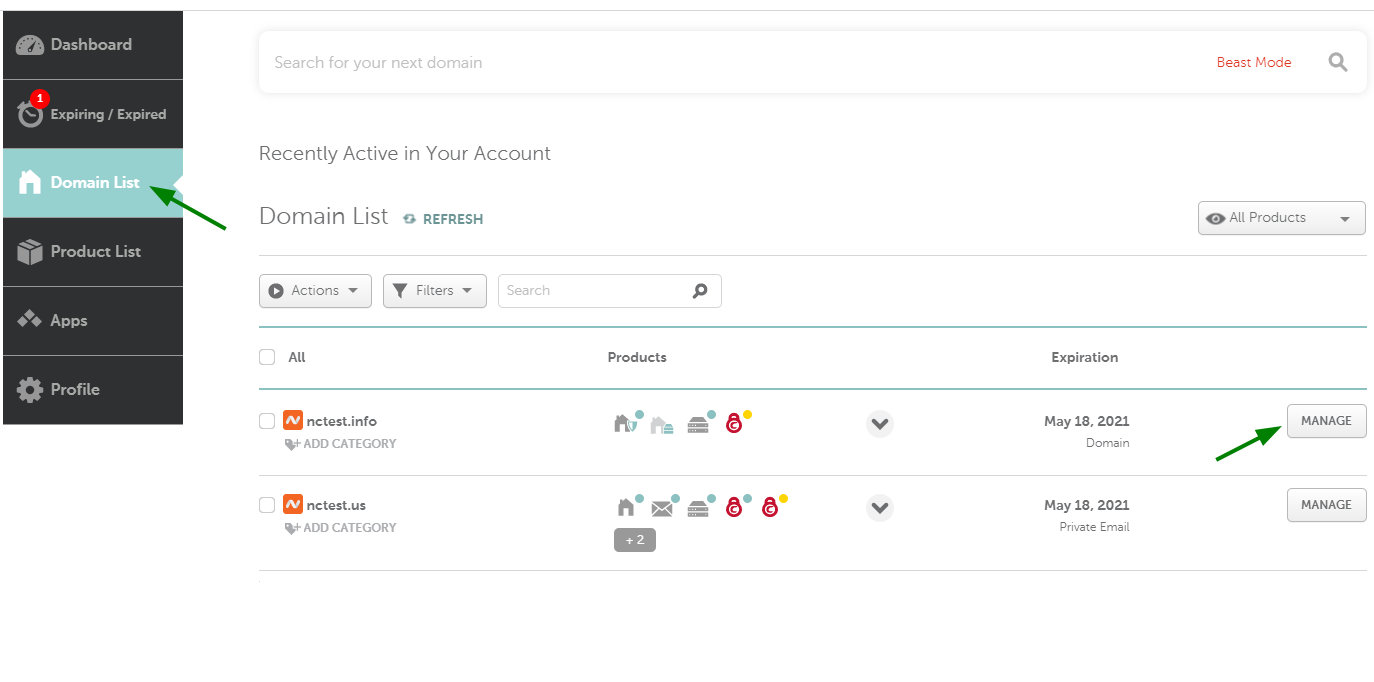
Namecheap's domain management dashboard
Namecheap also offers unlimited websites on their mid-tier plans, which can be valuable if you're managing multiple small websites and want to keep costs down.
Features Verdict
When it comes to hosting features, Hostinger takes the lead with more comprehensive offerings included in their base plans. Their AI website builder, managed WordPress options, and included CDN across all plans give them a significant edge.
However, if domain registration is your primary concern, Namecheap remains an excellent choice with competitive pricing and included privacy protection.
Ease of Use: User Experience Matters
A hosting provider's interface can significantly impact your day-to-day website management experience. Let's compare how user-friendly Hostinger and Namecheap are.
Hostinger User Experience
Hostinger uses a custom-built control panel called hPanel, which I found to be clean, intuitive, and well-organized. The dashboard provides easy access to all the essential features, and the learning curve is minimal even for beginners.

Hostinger's clean and intuitive hPanel dashboard
The account management area is separate from the website management panel, which helps keep things organized. I particularly appreciated how Hostinger's dashboard guides you through the initial setup process with clear steps and helpful tooltips.
Namecheap User Experience
Namecheap uses the industry-standard cPanel for website management. While cPanel is powerful and feature-rich, it has a steeper learning curve and a more cluttered interface compared to Hostinger's hPanel.
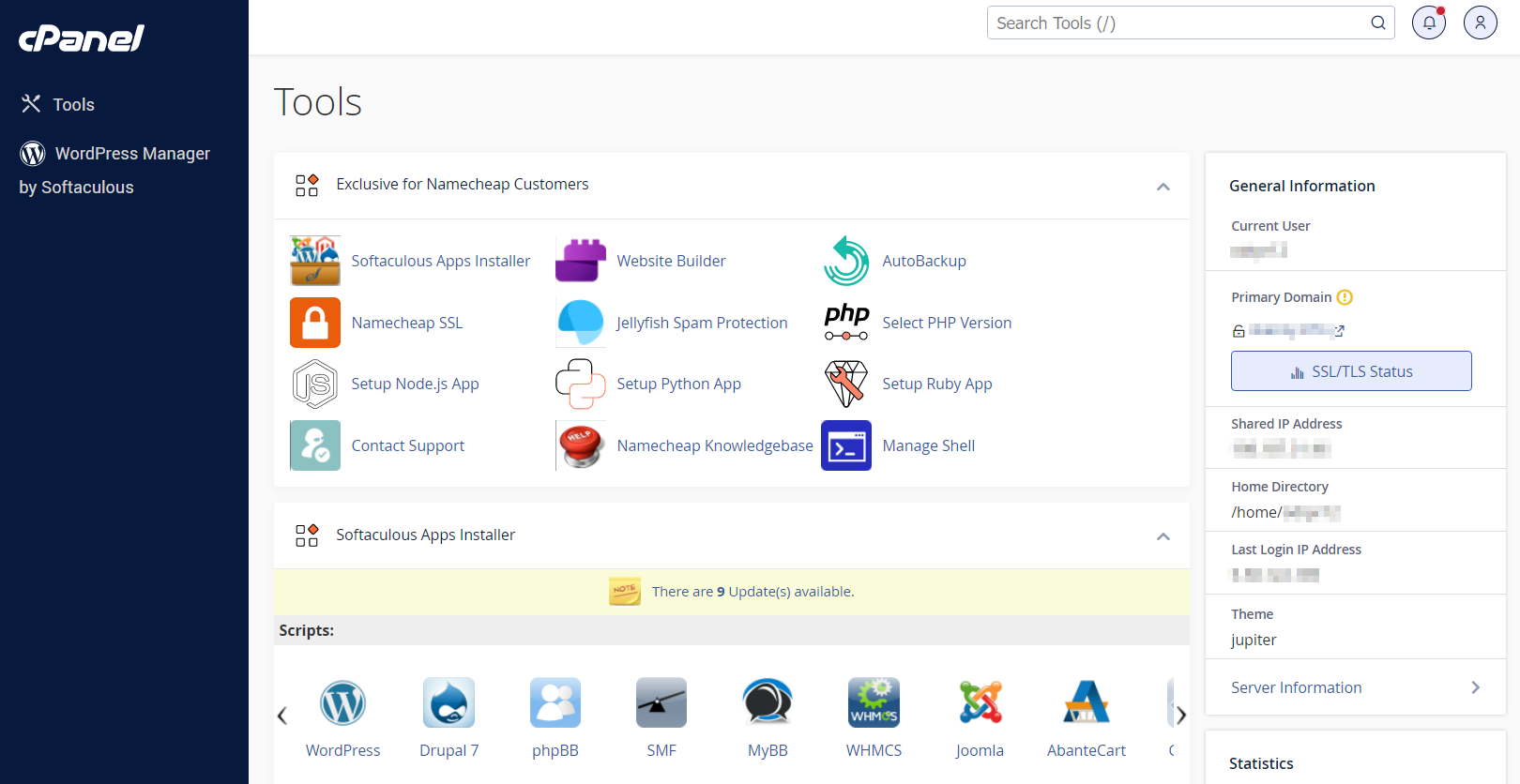
Namecheap's cPanel interface for website management
That said, if you're already familiar with cPanel from previous hosting experiences, you might prefer Namecheap's approach. Their domain management interface is particularly well-designed and easy to navigate.
WordPress Installation
Both providers offer one-click WordPress installation, but I found Hostinger's process to be slightly more streamlined. Hostinger also provides a guided setup that helps you configure essential settings and select a theme right from the start.
Hostinger Ease of Use Pros
- Clean, modern interface with hPanel
- Intuitive navigation and organization
- Helpful setup wizards for beginners
- Streamlined WordPress installation
- Mobile-friendly admin interface
Namecheap Ease of Use Pros
- Industry-standard cPanel interface
- Excellent domain management tools
- Familiar layout for experienced users
- Comprehensive documentation
- Clear account dashboard
Ease of Use Verdict
For beginners and those who value a modern, streamlined experience, Hostinger wins this round with its user-friendly hPanel and guided setup processes. However, if you're already comfortable with cPanel or manage many domains, Namecheap's familiar interface might be preferable.
Security Features: Keeping Your Website Safe
Website security is non-negotiable in today's digital landscape. Let's examine how Hostinger and Namecheap protect your website and data.
| Security Feature | Hostinger | Namecheap | Winner |
|---|---|---|---|
| SSL Certificates | Free unlimited lifetime SSL | Free for first year only, limited to 50 websites | Hostinger |
| Automated Backups | Weekly/daily (depending on plan) | Twice weekly (premium plans only) | Hostinger |
| DDoS Protection | Included on all plans | Not explicitly stated | Hostinger |
| Malware Scanning | Included | Available as add-on | Hostinger |
| Two-Factor Authentication | Available | Available | Tie |
Hostinger Security Features
Hostinger takes security seriously, offering a comprehensive set of features across all plans. Their free unlimited lifetime SSL certificates are particularly valuable, as they protect all your websites without additional costs after the first year.
I was impressed with Hostinger's built-in DDoS protection and regular automated backups. The weekly backups on basic plans are stored for 7 weeks, while daily backups on premium plans are kept for 7 days. You can also create on-demand backups whenever needed.
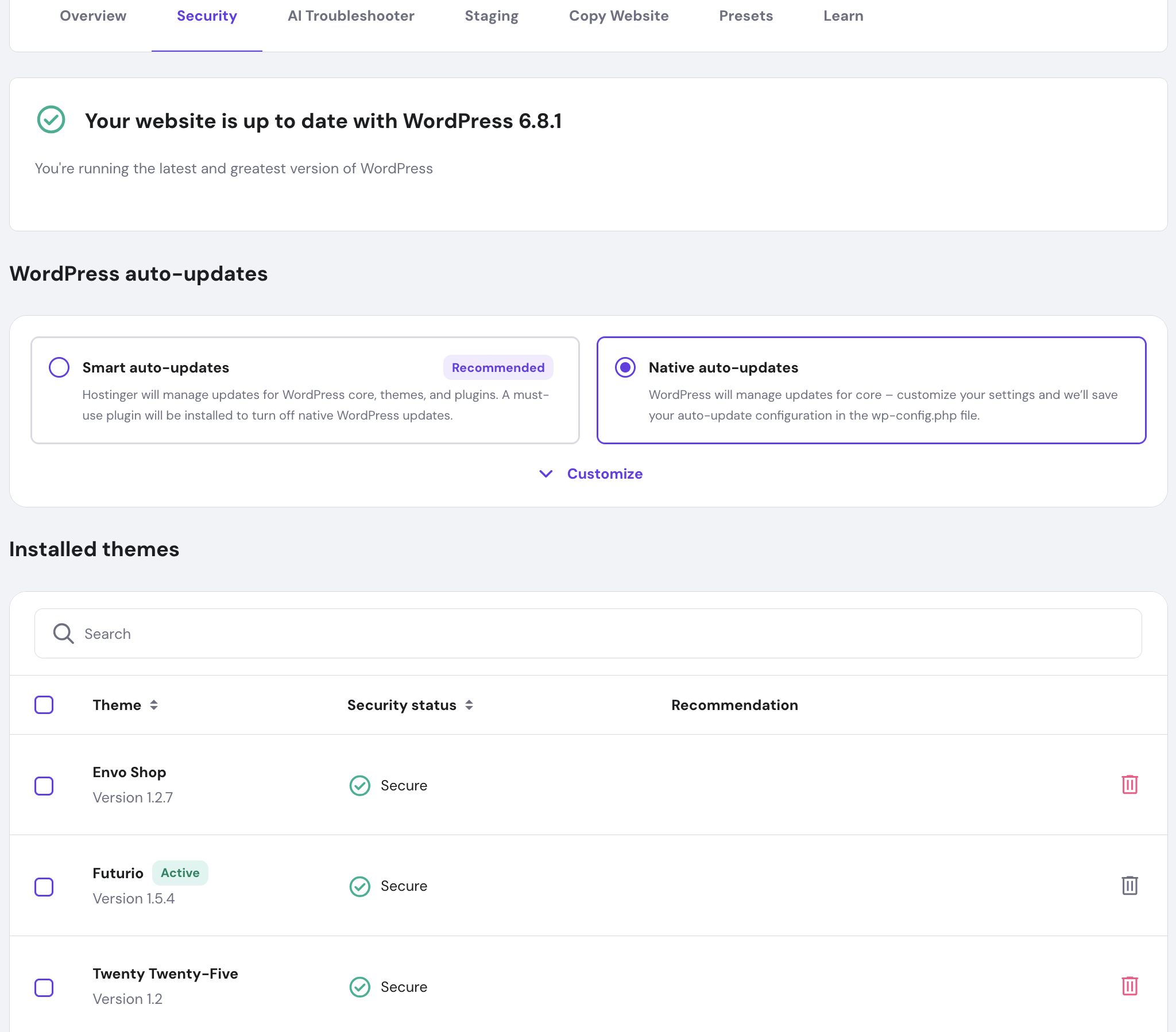
Hostinger's security features dashboard
Namecheap Security Features
Namecheap provides decent security features, but many are limited to premium plans or available as paid add-ons. Their SSL certificates are free for the first year but require payment after that, which can add to your long-term costs.
Automatic backups are only available on Stellar Plus or Stellar Business plans, and are conducted twice a week. While Namecheap doesn't explicitly mention DDoS protection, they do have security measures in place to handle potential attacks.
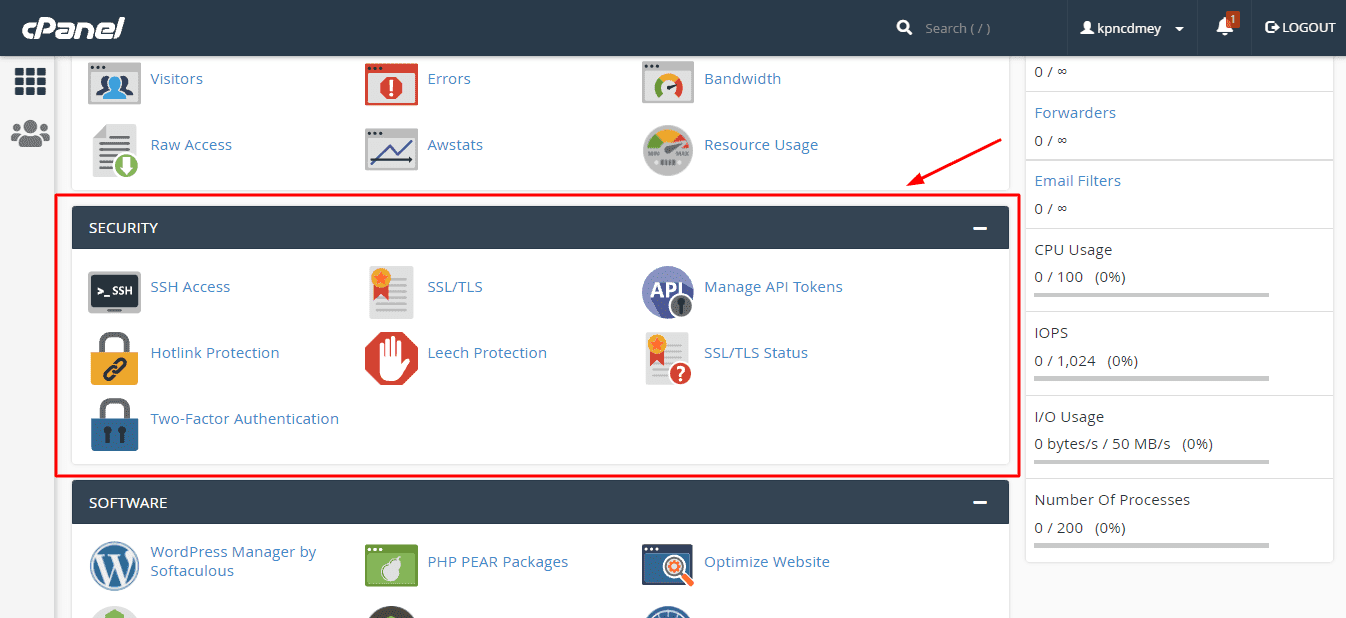
Namecheap's security settings panel
Security Verdict
When it comes to security features, Hostinger is the clear winner. They offer more comprehensive security features included in their base plans, with lifetime SSL certificates and regular backups being particularly valuable for website owners.
While Namecheap's security is adequate, the fact that many features are limited to premium plans or require additional payment after the first year makes them less appealing from a security standpoint.
Customer Support: Help When You Need It
Even with the most user-friendly hosting, you'll occasionally need support. Let's compare the customer service offerings from Hostinger and Namecheap.
| Support Feature | Hostinger | Namecheap | Winner |
|---|---|---|---|
| 24/7 Live Chat | Yes | Yes | Tie |
| Phone Support | No | No | Tie |
| Email Support | Yes | Yes | Tie |
| Knowledge Base | Comprehensive, well-organized | Extensive, detailed | Tie |
| Average Response Time | Under 5 minutes | Under 10 minutes | Hostinger |
My Support Experience with Hostinger
During my 30-day testing period, I contacted Hostinger's support team several times with various questions. Their live chat was consistently responsive, with wait times rarely exceeding 3-4 minutes. The support agents were knowledgeable and able to resolve most issues on the first contact.
I particularly appreciated Hostinger's detailed knowledge base, which includes step-by-step tutorials with screenshots for common tasks. This made it easy to find answers to basic questions without needing to contact support.

Hostinger's live chat support interface
My Support Experience with Namecheap
Namecheap also offers 24/7 support through live chat and email. In my experience, their response times were slightly longer than Hostinger's, averaging around 8-10 minutes for live chat. However, their support agents were equally knowledgeable and helpful.
Namecheap's knowledge base is extensive and well-organized, with detailed articles covering most common issues. They also offer a ticketing system for more complex problems that can't be resolved through live chat.

Namecheap's support ticket system
Customer Support Verdict
Both Hostinger and Namecheap offer solid customer support options, with 24/7 availability through multiple channels. Hostinger has a slight edge due to faster response times and a more user-friendly knowledge base, but Namecheap's support is also reliable and competent.
Neither provider offers phone support, which might be a drawback for users who prefer speaking with support agents directly. However, this is becoming increasingly common in the hosting industry as companies focus on chat and email support.
Final Verdict: Hostinger vs Namecheap
After 30 days of extensive testing and comparing both hosting providers across multiple categories, it's time for my final verdict.
Category Winners Recap:
- Pricing: Namecheap has lower initial prices, but Hostinger offers better overall value
- Performance: Hostinger wins with better overall reliability and global reach
- Features: Hostinger wins with more comprehensive offerings included in base plans
- Ease of Use: Hostinger wins with its user-friendly hPanel interface
- Security: Hostinger wins with more comprehensive security features
- Customer Support: Hostinger has a slight edge with faster response times
Based on my testing and analysis, Hostinger is the overall winner in this comparison. While Namecheap offers lower initial pricing, Hostinger provides significantly better value with more features included in their base plans, better security, and a more user-friendly experience.
That said, Namecheap remains an excellent choice for specific use cases:
Choose Hostinger if:
- You want the best overall performance and value
- You need modern features like AI tools
- Security is a top priority for your website
- You prefer a more intuitive dashboard experience
- You want lifetime SSL certificates included
Choose Namecheap if:
- You're on an extremely tight budget
- You primarily need domain registration services
- You prefer the traditional cPanel interface
- You need unlimited storage on basic plans
- You want a 100% uptime guarantee
My Personal Recommendation
After using both services extensively, I personally recommend Hostinger for most website owners. Their combination of affordable pricing, excellent performance, comprehensive features, and user-friendly interface makes them the better overall choice for both beginners and experienced users.
The value you get with Hostinger's plans is simply better in the long run, especially considering that many features that come standard with Hostinger would require upgrades or add-ons with Namecheap.

My test website running on Hostinger showing excellent performance metrics
Remember that both providers offer a 30-day money-back guarantee, so you can try either one risk-free to see which better suits your specific needs.
